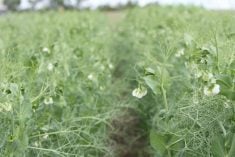If Americans are asked whether they want their tax dollars spent on
guns or butter, a North Dakota farm leader thinks they will choose guns.
That means next time U.S. farmers ask for emergency aid from Congress,
they’ll probably discover all the money has been spent on the military,
homeland security, and a war with Iraq.
“The focus of our federal spending is going to be on other areas that
the public deems more important than agriculture,” speculated Eric
Read Also

Prairies have variable soil moisture conditions
The dry weather in the west was welcome for preserving grain quality and advancing harvest, but it has resulted in very dry soil moisture conditions.
Aasmundstad, president of the North Dakota Farm Bureau, in an interview
after a speech to the Manitoba Farm Writers and Broadcasters
Association.
“I think it’s going to impact the support for farmers greatly.”
Aasmundstad’s organization and other state farm bureaus are farmer
organizations that generally support free market approaches to
agriculture.
The U.S. National Farmers Union, which also represents farmers across
the country, supports more government regulation and support.
Aasmundstad said his organization is hoping the U.S. Congress will
radically revamp American farm policy, moving away from ad hoc disaster
payments and moving toward crop insurance, which would reflect the true
cost of production and for which farmers would pay premiums.
This support for replacing disaster payments and other subsidies
doesn’t mean the North Dakota Farm Bureau opposes the recently passed
farm bill, which will send billions of dollars to American farmers over
the next six to 10 years.
“As much as we dislike subsidies, the need for an ad hoc disaster
payment one more time is crucial, or there will be farm sales up and
down the central U.S.,” said Aasmundstad.
The farm bill was passed a few months ago, and lays out a plan for
payments for at least the next six years, but Aasmundstad said recent
elections in the U.S. will alter or cancel the plan.
“With the change in leadership, my guess is that come January (when the
composition of the House of Representatives and the Senate change), all
bets are off,” he said.
Moving to a system of crop insurance would allow farmers to farm more
intelligently and wean them from reliance on a federal government that
may in the future not feel as much sympathy as farmers have been used
to, said Aasmundstad.















